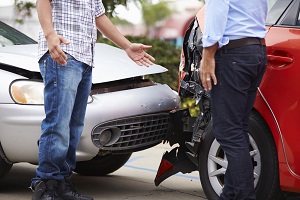 You know that you didn’t cause the crash that resulted in your physical injuries, but if you want to recover damages in a settlement or in court then you are going to have to prove that someone else did cause the crash. Specifically, you are going to have to prove that the other driver’s negligence caused the crash and your resulting injuries.
You know that you didn’t cause the crash that resulted in your physical injuries, but if you want to recover damages in a settlement or in court then you are going to have to prove that someone else did cause the crash. Specifically, you are going to have to prove that the other driver’s negligence caused the crash and your resulting injuries.
Immediately after the crash, the other drivers, witnesses, and police may all have different accounts of what happened. It is up to you and your attorney to prove the other driver’s negligence to the insurance company or to the court in order to recover damages.
Here’s How to Do It
In order to prove that the other driver was negligent, you must provide evidence proving that the driver was negligent, as that term is defined legally. Specifically, you must provide evidence that proves that:
- The driver owed you a duty of care. All motorists are presumed to have a common duty of preventing harm to others. Once they are on the road, drivers accept responsibility that they are to behave in a way that doesn’t cause harm to others.
- The driver breached the duty of care. A driver breaches his duty of care when he fails to act like a reasonable driver would act in a similar situation. For example, if a driver doesn’t obey the law or ignores it altogether by speeding or driving recklessly, then the driver breached his duty of care.
- The driver’s breach of the duty of care caused your injuries. Once you establish that the driver breached the duty of care, then you will have to show that the actions or inactions which breached the duty of care caused your injuries. Specifically, you will have to prove that your injuries would not have happened but for the driver’s breach of the duty of care.
- You are legally entitled to damages. After causation is determined, you will need to provide evidence of what damages were caused by the breach of the duty of care. You will need to prove what injuries or damage occurred during the wreck and establish that you have the legal right to recover damages in a personal injury lawsuit.
Negligence may be established any time these four elements can be proven. Some common examples of negligence include texting while driving, violating a traffic signal, and following another vehicle too closely. It is important to remember that these are just examples and not an all-inclusive list.
Evidence Is an Important Part of Proving Negligence
Collecting evidence soon as possible after a crash could help make the process of filing a car accident lawsuit easier for you. Some of the evidence that might be important in proving your negligence claim includes:
- Eyewitness reports of the crash.
- Video or photos of the accident site. This may include pictures of the vehicles involved, road conditions, traffic signs, and injuries.
- Police reports, including the accident report.
- Medical records.
- Phone records.
- Other pertinent information that describes what happened at the accident or your resulting injuries.
You may be able to gather some of this evidence quickly—even at the accident scene—and your attorney may help you recover the rest through the legal discovery process. The legal discovery process typically comes after you file a case and may include things such as written interrogatories, depositions, and requests for production of documents.
You Don’t Have to Handle Your Case Alone
The defendant(s) will try to refute one or more elements of your negligence claim in order to avoid paying damages. Accordingly, it is important to be prepared for these arguments and to be proactive in protecting your rights.
If you believe that you’ve been hurt by someone else’s negligence then we encourage you to take an important first step and to contact an experienced Louisville car accident lawyer for a free consultation. Your time to take action is limited by the Kentucky statute of limitations. Therefore, we encourage you to take action quickly to protect your recovery. We are available around the clock, every day of the year, and we look forward to hearing from you.
RELATED LINKS